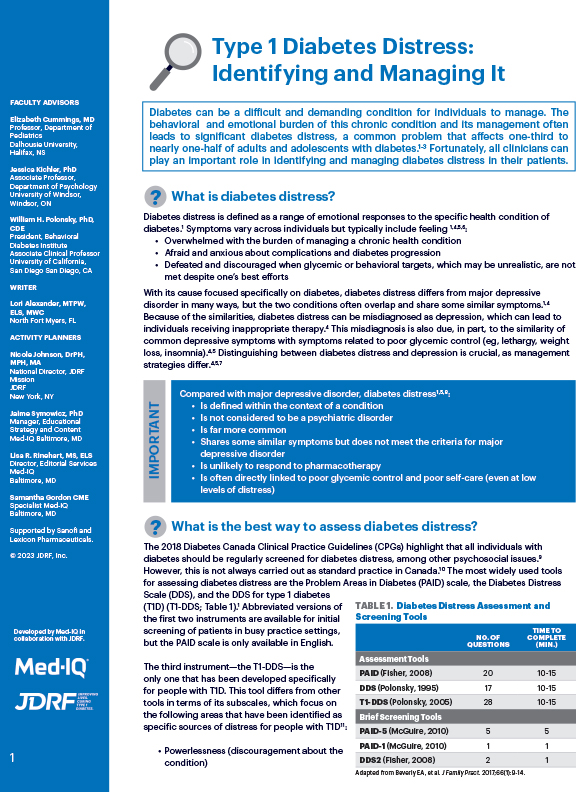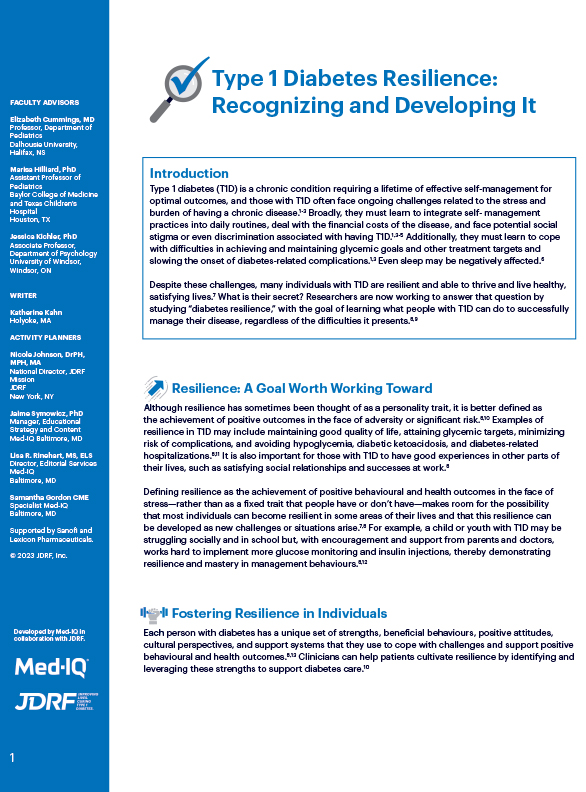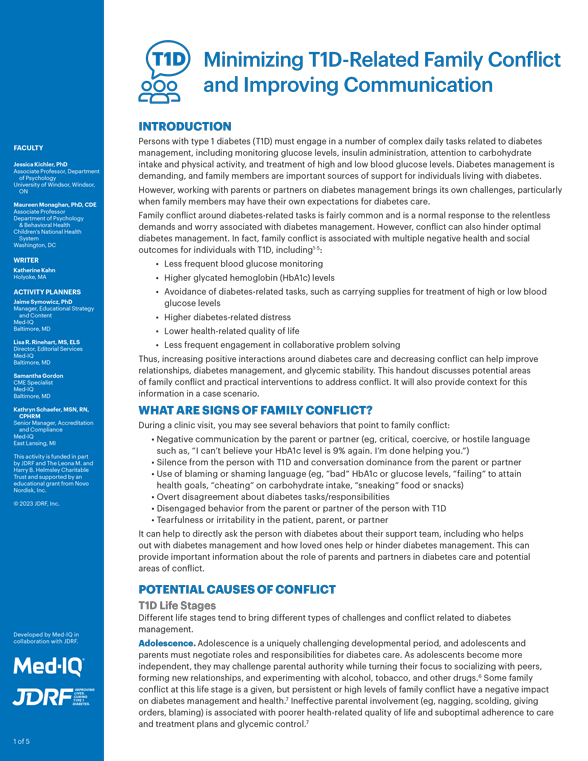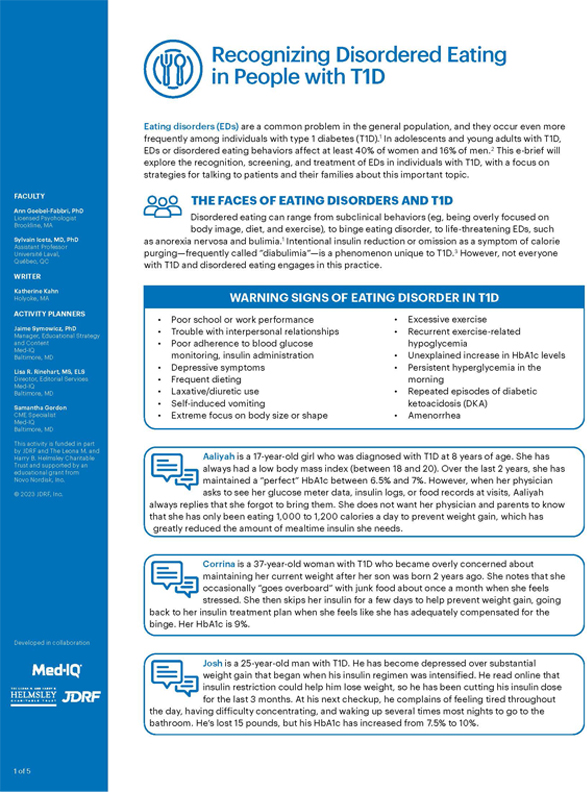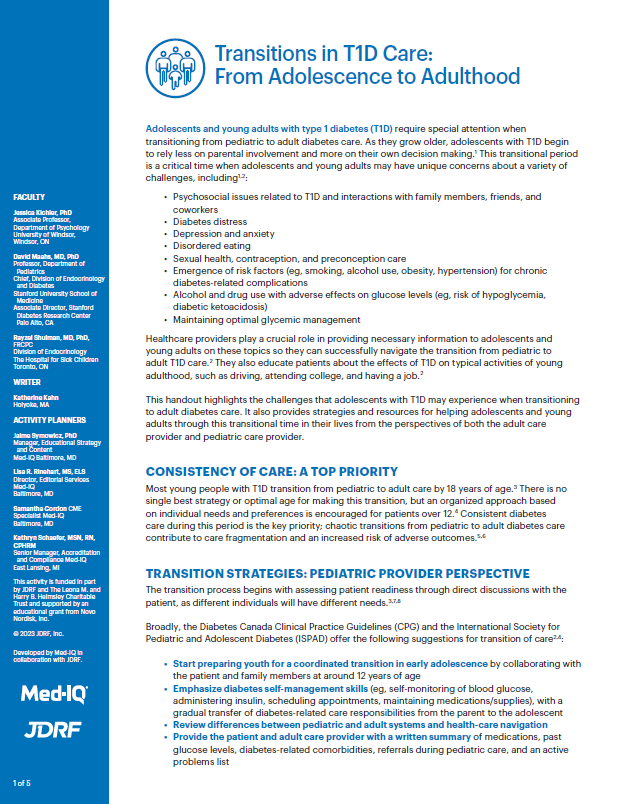Mental Health and T1D for healthcare professionals
Mental health matters. Especially when living with type 1 diabetes (T1D), a chronic condition that can require up to 300 additional decisions every day about food, rest, play and more.

T1D and mental health
Living with type 1 diabetes (T1D) means a constant balancing act of measuring blood glucose levels and administering insulin to help try and stave off episodes of low and high blood sugars (hypo and hyperglycemic episodes) and knowing that there is a myriad of potential diabetes related complications, including blindness, kidney disease, amputation and even possible death. T1D never takes a break or gives a day off.
As a result, diabetes affects a person’s emotional, social, and behavioural wellbeing, known collectively as psychosocial health, throughout their lifetime living with the condition. But standard care for diabetes doesn’t always address or include mental health concerns due to lack of time, clear guidelines, or well-defined and known referral pathways. Patients may also be hesitant to raise mental health concerns with their primary care providers due to perceived stigma and other factors. And for those who do get connected to a mental health provider, they often find that their provider doesn’t have sufficient knowledge about what makes diabetes so challenging to offer meaningful support.
The primary focus of diabetes care teams is to treat physical symptoms. However, studies have shown mental health affects physical health and with T1D, can impact blood glucose measures. Most mental health providers have limited knowledge of the specific mental health impacts of this chronic condition, and people who live with diabetes often bear the burden of explaining their condition and why it affects their mental health to their provider.
Breakthrough T1D Canada’s Mental Health Strategy aims to close some of these gaps in care to improve both the quality of life and health outcomes for Canadians with T1D. The key pillars of our Mental Health Strategy include training and engaging healthcare professionals, community support programs, and research funding specifically related to mental health.
Mental Health + Diabetes Training Program
The Mental Health + Diabetes Training Program, in collaboration with Diabetes Canada, launched in early 2023, to help fill the knowledge gap that many mental health providers have when treating patients with diabetes. People who live with T1D and type 2 diabetes (T2D) have the constant burden of managing their condition and don’t always get the additional supports they need. This, along with other aspects of T1D, have been shown to negatively impact mental health. With the increasing prevalence of diabetes and the exacerbation of mental health problems due to the COVID-19 pandemic, it is more important than ever for healthcare providers to put themselves in the best position to support their patients.
The Mental Health + Diabetes Training Program has been designed for registered mental health providers in Canada, including registered psychologists, clinical counsellors, psychotherapists, social workers, psychiatrists, and mental health nurses, who upon completion will have the option to be listed in a new Mental Health + Diabetes Directory, a Canadian directory of mental health providers with diabetes knowledge and education (see below). This Training Program is also open to other healthcare professionals and people affected by diabetes, although these individuals will not be eligible to be listed in the Directory.
By completing this course, mental health providers will learn to integrate knowledge of diabetes into practice to better support Canadians living with T1D or T2D and their family members.
Breakthrough T1D Canada is approved by the Canadian Psychological Association to offer continuing education for psychologists. Breakthrough T1D Canada maintains responsibility for the program.

Click here to register.
Mental Health + Diabetes Directory
Breakthrough T1D Canada, in collaboration with Diabetes Canada, have launched the Mental Health + Diabetes Directory. This is a new, national and publicly accessible Directory of Canadian mental health providers with the awareness, tools, and understanding of the lived experience of diabetes. Registered mental health providers in the Directory must successfully complete the Training Program to be listed. The Directory will allow diabetes care teams and other frontline care providers a new referral pathway to easily identify qualified mental health professionals when their patients need support. People living with or affected by diabetes will also be able to access the Directory and self-refer if they choose.
Snapshots of T1D and mental health for healthcare providers
E-briefs are being developed in collaboration with Canadian and international experts to share up-to-date educational information with healthcare providers on psychosocial health and T1D. Be sure to check back for updated content or click here to sign up to receive more information. We encourage sharing these educational materials with colleagues in your network.
Research funding
As part of our Mental Health Strategy and with support of our partners, Breakthrough T1D Canada will fund multiple new research grants in T1D and psychosocial health over the coming years. Our goal is to support the development and testing of sustainable, scalable approaches that will improve support for Canadians who live with T1D and are affected by mental health issues. Ideally, this will translate into better quality of life and diabetes-related health outcomes for these populations. To check for active funding opportunities, please see our Grant Opportunities page.
Diabetes psychology fellowships
To increase capacity in T1D-related clinical psychology and T1D-related psychology research, Breakthrough T1D International has created a Diabetes Psychology Fellowship program which is open to global applicants. The applicant is required to work with a mentor who can provide a training environment conducive to a career in T1D-relevant psychosocial research. The fellowship program encourages a combination of clinical diabetes care and diabetes research. At the time of activating the award, the applicant must have a doctoral degree (PhD, PsyD, MD), or the equivalent from an accredited institution and must not be simultaneously serving an internship or residency. Please visit Breakthrough T1D’s Grant Center for more information. Contact us at research@BreakthroughT1D.ca to learn more.
If you have more questions about our programs for healthcare professionals on T1D and mental health, please reach out to us at mentalhealthstrategy@BreakthroughT1D.ca for more information.
Partner with Breakthrough T1D Canada
As we continue to expand the Mental Health Strategy, we are actively seeking partners in several areas to extend our reach across Canada. These include healthcare provider engagement as well as community engagement and programming. If you are interested in partnership opportunities please contact Amanda Hailman, National Manager of Mental Health Programs at mentalhealthstrategy@BreakthroughT1D.ca
Our Mental Health Strategy is being driven by Breakthrough T1D Canada’s Campaign to Accelerate.
